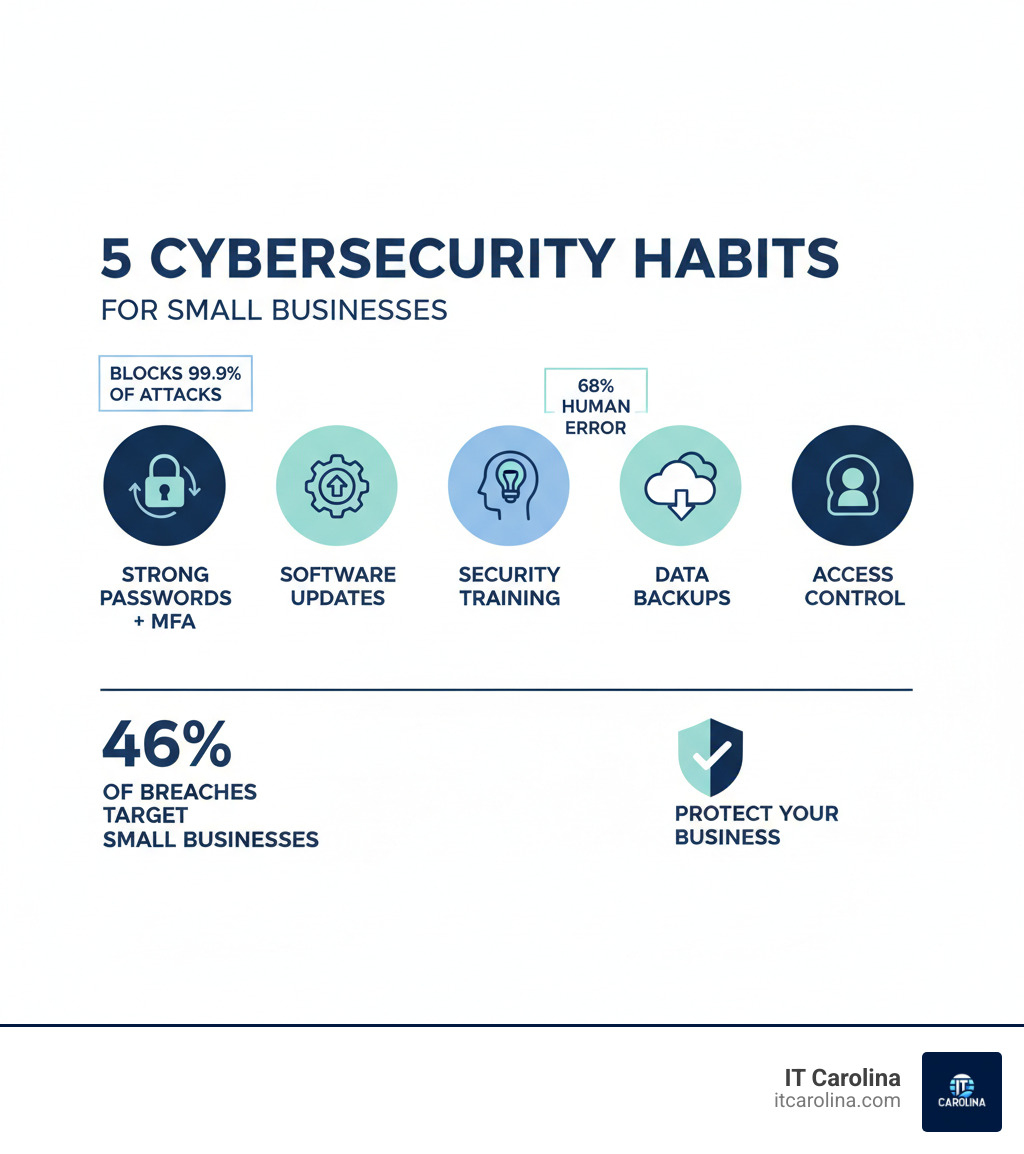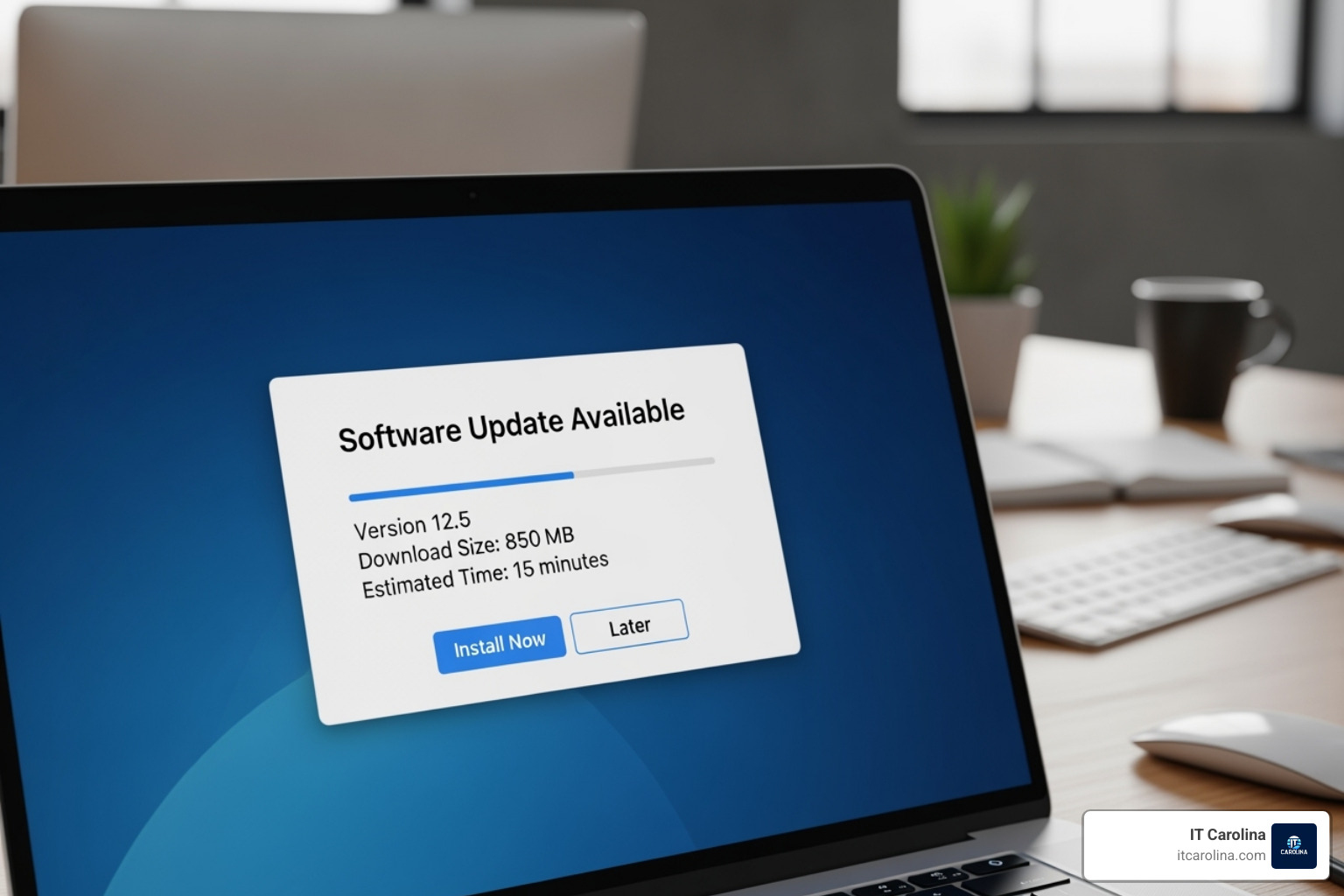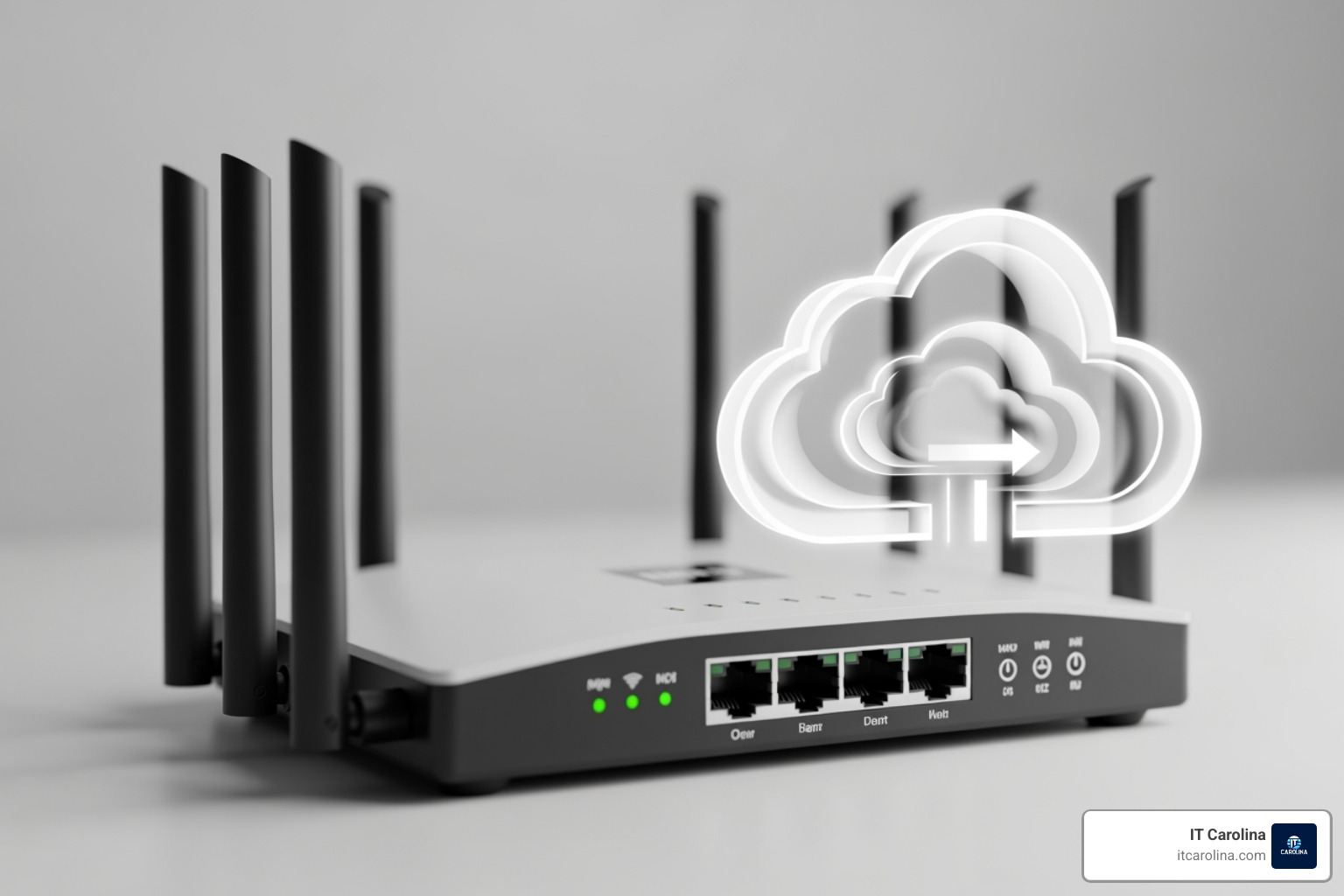Why Small Businesses Are a Prime Target for Cyber Attacks
Adopting 5 Cybersecurity Habits Every Small Business Must Adopt is essential for protecting your business from increasingly sophisticated cyber threats. Cybercriminals no longer focus only on large corporations; 46% of all cybersecurity breaches now target businesses with fewer than 1,000 employees. Small businesses are often seen as easy targets due to fewer IT resources and security protocols.
The numbers are sobering. The UK Government’s Cyber Security Breaches Survey 2025 found that 43% of businesses reported a cyber attack in the past 12 months, with the average cost for a small business hitting £3,550 (roughly $4,400). Even more concerning, more than 80% of successful breaches start with human error.
The good news is that effective cybersecurity doesn’t require a massive budget. It’s about building simple, practical habits. Here are the five essentials:
- Strong Passwords + Multi-Factor Authentication (MFA)
- Regular Software Updates
- Employee Security Training
- Data Backups + Network Security
- Access Control + Monitoring
These habits are non-negotiable because the threats are real and common. Small businesses frequently face:
- Phishing: Deceptive emails or messages designed to trick employees into revealing sensitive information like passwords.
- Ransomware: Malicious software that encrypts your files, holding your business hostage until a ransom is paid.
- Data Breaches: Unauthorized access to sensitive data, including customer information and financial records, which can destroy your reputation.
Adopting these five habits isn’t just good practice—it’s fundamental to your business’s survival and success.

Habit 1: Fortify Your Logins with Strong Passwords and MFA

Your login credentials are the keys to your digital business. Using weak or reused passwords is like leaving a key under the doormat—cybercriminals know exactly where to look. Hackers use credential stuffing attacks, taking usernames and passwords from one data breach and automatically trying them on other sites. This is why locking down your logins is the first of the 5 Cybersecurity Habits Every Small Business Must Adopt.
Create and Manage Unbreakable Passwords
Weak passwords are a leading cause of breaches. The Verizon Data Breach Investigations Report 2025 found that about 88% of web application attacks involved stolen credentials. A strong password isn’t about complexity you can’t remember; it’s about following simple rules:
- Length is key: Aim for at least 12 characters—longer is better.
- Use a mix: Combine uppercase and lowercase letters, numbers, and symbols.
- Be unique: Every single account needs its own password.
This is where password managers become essential. These tools generate and store strong, unique passwords for all your accounts in a secure, encrypted vault. You only need to remember one master password. They eliminate human error and are a game-changer for small business security. For more tips, see our guide on essential online security.
Enable Multi-Factor Authentication (MFA) Everywhere
Even a strong password can be stolen. Multi-Factor Authentication (MFA) is your best defense against this. MFA requires a second piece of information to log in, proving your identity with something you know (your password) plus something you have (your phone) or something you are (your fingerprint).
Even if a hacker steals your password, they can’t access your account without that second factor. The most secure options are authenticator apps (like Google Authenticator) or biometric authentication (fingerprint or face ID). SMS codes also work but are slightly less secure.
Here’s the most important statistic: according to Microsoft, MFA blocks over 99.9% of automated account compromise attacks. Setting up MFA on your critical accounts—email, cloud storage, payroll, and banking—is the single most effective security step you can take today.
Habit 2: Stay Ahead of Threats with Regular Software Updates

Those software update notifications that pop up at inconvenient times are one of your most important defenses against cyber attacks. When software companies find a security flaw, they release a patch to fix it. If you don’t install that patch, you’re leaving a known vulnerability open for criminals to exploit. Cybercriminals actively hunt for businesses running outdated software because it’s an easy way in.
The Critical Role of Patching and Updates
According to security researchers at Sophos, unpatched software vulnerabilities are the most brutal ransomware attack vector. Hackers don’t need sophisticated skills when they can simply exploit a known, unpatched weakness. Yet many small businesses delay updates, leaving their systems vulnerable.
Security patches are urgent fixes for specific vulnerabilities and are non-negotiable. They must be applied promptly. This applies to everything connected to your network:
- Operating Systems (Windows, macOS)
- Web Browsers (Chrome, Edge, Firefox)
- Antivirus Software
- Business Applications (accounting, email, etc.)
- Network Hardware (routers, firewalls)
Automated updates are your best friend. Enable them whenever possible so patches are applied in the background or overnight. For critical systems, aim to install security updates within 24-48 hours of release. A few minutes of inconvenience from an update is far better than the chaos of a ransomware attack. Making regular updates one of the 5 Cybersecurity Habits Every Small Business Must Adopt seals the cracks in your digital armor. For more guidance, check out our guide on how to fight computer viruses.
Habit 3: Build a Human Firewall Through Employee Training

You can have the best security technology in the world, but if your team isn’t trained to spot a threat, your business remains vulnerable. According to Verizon’s 2024 Data Breach Investigations Report, the human element was involved in 68% of breaches. Cybercriminals know it’s often easier to trick a person than to hack a system. This makes employee training a critical component of the 5 Cybersecurity Habits Every Small Business Must Adopt.
Train Your Team to Be Your First Line of Defense
Think of training as empowering your team to be your first line of defense. Social engineering attacks like phishing rely on human manipulation, and a well-trained employee can stop them cold. The key is teaching everyone to recognize the red flags:
- Suspicious Emails: Does the sender’s email address look strange? Does a link’s destination (visible when you hover over it) not match the text?
- Urgent or Threatening Language: Attackers create a sense of panic to make you click without thinking. Teach your team to pause and verify any urgent requests for information or action.
Phishing simulations are an excellent way to provide real-world practice. Sending fake phishing emails in a controlled environment helps employees learn to identify scams without real risk. It’s like a fire drill for cyber threats.
Equally important is having clear reporting procedures. Your team must feel safe reporting anything suspicious, even if it turns out to be a false alarm. A culture of security awareness, where everyone feels responsible, is one of the most cost-effective ways to reduce risk. For more tips, see our guide on Cybersecurity Tips for Small Businesses: Protect Your Data.
Habit 4: Secure Your Data with Backups and Network Protection

Imagine all your business data—customer lists, financial records, project files—suddenly gone. This nightmare scenario is preventable with two powerful habits: robust data backups and a secure network.
Implement a Bulletproof Data Backup Strategy
Even with great defenses, things can go wrong. A ransomware attack, a failed hard drive, or human error can lead to data loss. Your backup is your lifeline.
The gold standard is the “3-2-1 backup rule”: keep three copies of your data on two different types of media, with one copy stored offsite (in the cloud or another physical location). This protects you from local disasters and network-wide ransomware attacks.
Key actions for a successful backup strategy include:
- Automate daily backups: Manual backups are easily forgotten.
- Encrypt your backups: This ensures that even if a backup is stolen, the data remains unreadable.
- Routinely test your restore process: A backup is useless if it can’t be restored. Test it quarterly to ensure it works before an emergency strikes. CISA’s ransomware guidance strongly recommends this.
If you’re concerned about past exposure, our guide can help: Has my data been leaked? How to Check and What to Do.
Lock Down Your Business Wi-Fi
Your Wi-Fi network is a highway for your business data. An unsecured network allows criminals to snoop on your traffic, steal information, or access your internal systems. Securing your Wi-Fi is a fundamental part of the 5 Cybersecurity Habits Every Small Business Must Adopt.
Follow these essential steps:
- Use strong encryption: Use WPA3 or, at a minimum, WPA2-AES.
- Change default router credentials: The factory-set username and password (like “admin/password”) are public knowledge.
- Set up a separate guest network: Isolate visitors and non-essential devices from your main business network.
- Disable WPS (Wi-Fi Protected Setup): This feature has known vulnerabilities.
- Keep firmware updated: Your router needs security patches just like your computers.
- Use a VPN (Virtual Private Network): Essential for anyone working remotely to encrypt traffic on public Wi-Fi.
Managing these details can be overwhelming. That’s why we offer Proactive IT services to handle your network security without the jargon.
The 5 Cybersecurity Habits Every Small Business Must Adopt: A Quick Checklist
Cybersecurity is manageable when broken down into consistent habits. Use this checklist as a quick reference for the 5 Cybersecurity Habits Every Small Business Must Adopt and the foundational practices that support them.
Habit 1: Fortify Your Logins
- Use long, unique passwords (12+ characters) for every account. Use a password manager.
- Enable Multi-Factor Authentication (MFA) on all critical systems (email, banking, cloud storage).
Habit 2: Regular Software Updates
- Turn on automatic updates for operating systems, applications, and security software.
- Apply critical security patches within 24-48 hours of release.
Habit 3: Employee Training
- Conduct regular, practical training on how to spot phishing and social engineering.
- Run phishing simulations to test and reinforce learning.
- Establish a clear, no-blame process for reporting suspicious activity.
Habit 4: Secure Your Data and Network
- Follow the 3-2-1 backup rule (3 copies, 2 media, 1 offsite).
- Automate, encrypt, and regularly test your backups.
- Secure your Wi-Fi with WPA3 encryption, a strong unique password, and a separate guest network.
Habit 5: Access Control and Monitoring
- Implement the “principle of least privilege.” Give employees access only to the data and systems they absolutely need to do their jobs. Review these permissions quarterly.
- Have a strict offboarding process. Immediately revoke all access for former employees. Lingering “ghost accounts” are a major security risk.
- Use foundational tools. A properly configured firewall acts as a gatekeeper for your network traffic, while up-to-date antivirus software scans for malware. Both are essential.
- Monitor for suspicious activity. Set up alerts for unusual login attempts or data access patterns. Reviewing logs can help you spot a threat early.
Finally, create a simple incident response plan. Know what to do if you suspect a breach: who to call, how to contain the damage, and how to communicate. The Federal Trade Commission’s Data Breach Response Guide is a great starting point. These habits work together to create a strong, layered defense for your business.
Frequently Asked Questions About Small Business Cybersecurity
Cybersecurity can seem complex, but many small business owners have the same questions. Here are concise answers to the most common ones.
What is the most important first step for a business new to cybersecurity?
The single most impactful first step is educating your team. Since the human element is involved in 68% of breaches, training provides the biggest return on investment. Teach everyone what phishing looks like and why their actions matter. After that, tackle two quick wins: change all default passwords on your hardware (routers, etc.) and update all critical software (operating systems, browsers). For a more structured approach, a professional security assessment can identify your biggest risks and help you prioritize your efforts.
What should a business do if it suspects a security breach?
Act immediately—every minute counts. Follow these steps:
- Isolate affected devices. Disconnect them from the network (unplug ethernet or turn off Wi-Fi) to stop the threat from spreading.
- Notify your IT support. Contact your IT partner or internal expert. Do not try to fix it yourself, as you could make it worse or destroy evidence.
- Contain the incident. Your IT support will help contain the threat, which may involve shutting down systems or forcing password resets.
- Assess the damage. Once contained, determine what systems and data were affected.
- Follow your incident response plan. This plan should dictate who to notify (including legal counsel if customer data is involved) and how to communicate with stakeholders. The Federal Trade Commission’s Data Breach Response Guide provides a clear framework.
How often should we review our cybersecurity practices?
Cybersecurity is not a one-time task. Threats are constantly evolving, so your defenses must too. A good rhythm is:
- Quarterly Reviews: A quick check-in to ensure your core habits are being followed. Are backups running? Are updates being applied? Is MFA enabled everywhere?
- Annual Risk Assessment: A more comprehensive review of your security posture. Have your business operations or technologies changed? This helps identify new vulnerabilities.
- Review After Major Changes: Always review security after significant events like hiring new employees, adopting new cloud services, or opening a new location.
Conclusion: Make Cybersecurity a Part of Your Business DNA

We’ve covered the 5 Cybersecurity Habits Every Small Business Must Adopt: strong logins, regular updates, employee training, secure data, and controlled access. But cybersecurity isn’t a project with a finish line; it’s an ongoing commitment that must be woven into your business’s DNA.
Think of it like locking your store at night—it’s a non-negotiable, routine part of protecting what you’ve built. The good news is that these habits are not complicated or expensive. They require consistency and a proactive mindset.
To make these habits stick, leadership must set the example. When security is treated as a priority, it creates a culture where everyone feels responsible. Consistency is key—regular reviews and ongoing training are far more effective than a one-time effort. While cyber liability insurance can be a valuable safety net, it cannot restore lost customer trust. Your best protection is a strong defense.
At IT Carolina, we help small businesses in Charlotte steer these challenges without the jargon or high costs. We know you’re busy running your business, not managing firewalls. Our flat-rate pricing, quick response times, and local presence mean you get reliable support when you need it.
Ready to turn cybersecurity from a source of stress into a source of confidence? Let’s build a stronger, safer business together. Get professional IT support for your small business in Charlotte and find how friendly, reliable IT can protect what you’ve worked so hard to build.